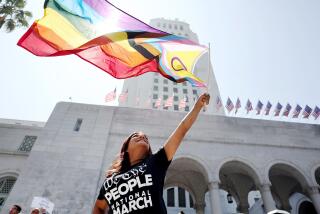Methodists Coming to Terms With Gays
- Share via
Sidestepping a divisive debate over homosexuality that has split Methodist church groups elsewhere in the country, United Methodists in Southern California are developing a new tack aimed at satisfying gay rights advocates and traditionalists.
Instead of going on record as officially accepting or rejecting homosexuality as being compatible with Christian belief, delegates to the yearly meeting of the church’s regional jurisdiction--known as the California-Pacific Annual Conference--have simply voted to ask their 407 local congregations to be “welcoming” to all people regardless of their sexual orientation. The conference covers Southern California, Hawaii, Guam and Saipan.
The wording is aimed at avoiding two ideological and controversial alternative labels that have ignited controversy elsewhere.
Elsewhere, Methodist bodies have split between two terms--”reconciling” and “transforming.”
*
So-called reconciling congregations and annual conferences are on record as accepting gay men and lesbians unconditionally as they are. It is the term favored by gay rights advocates. Six annual conferences and 150 congregations have declared themselves as “reconciling,” a national church spokeswoman in New York said.
The term “transforming”--favored by traditionalists--puts those congregations on record as viewing homosexuality as sinful but believing that God can transform gay men and lesbians into heterosexuals.
As of March, 62 congregations in the United States have declared themselves as “transforming,” according to a newsletter published by the Rev. Robert Kuyper, a Methodist minister in Bakersfield who is active in the transformation movement.
Debate about those two terms has often brought controversy and division. Indeed, a year ago when the California-Pacific Annual Conference was asked to call itself “reconciling,” tensions were high.
“It seemed destined to hit the conference floor last year like an atomic bomb with people very polarized,” said H. Newton Malony, a United Methodist minister and professor of clinical psychology at Fuller Theological Seminary in Pasadena.
“I would say [it was] tense,” Bishop Roy I. Sano said in an interview. “I didn’t think it was going to be explosive, but I would say tense and weary. There was a kind of longing for another way.”
Another way turned out to be “welcoming,” a term that advocates on both sides of the debate say is more than a semantic sleight of hand that papers over differences. Agreement on the word, Sano and others said, has opened up a respectful dialogue among Methodists of widely conflicting views.
“It’s a foundation on which we have a lot more to build. . . . The next step is to spread the discussion into our local churches,” Sano said. “In too many of our churches, sexuality is simply taboo. Potential controversies are avoided. But the participants at the annual conference experienced a new kind of engagement across our differences that is very promising.”
Sano has made no secret where he stands. He was one of 15 United Methodist bishops who signed a 1996 statement expressing pain at the church’s refusal to ordain homosexuals and asked for a review of the policy.
So it may surprise some that Sano said in an interview that those like himself who favor the ordination of gays and lesbians may have to more seriously examine the views of traditionalists and consider the possibility that perhaps some gay men or lesbians can change to a heterosexual lifestyle.
“If their perceived sexual orientation can change, we have to allow that to happen. And if it cannot, we need to reflect on our experiences with these people,” Sano said. “I think we may come out in a new place than where we are--a denomination that censures these persons and their behavior.”
But Sano is also asking traditionalists to consider new information. “We have to hear more from the sciences [regarding human sexuality]. We have to reflect critically on the way we read the Bible as well as our tradition. We may be at a time when we have to reformulate our faith as we’ve had to do at other junctures of church history when we were divided.”
Meanwhile, those on both sides of the issue are hailing the turn of events, among them the Rev. Ignacio Castuera of North Glendale United Methodist Church, who has long been an advocate of gay ministry.
“I am convinced after nearly 30 years of struggling with this that this is not the kind of thing that can be solved legislatively,” he said. He noted that when the California-Nevada Conference, which covers Northern California, declared itself a reconciling conference, “fundamentalists” there attempted to form their own jurisdictional body. Without an overwhelming majority, he said, any vote “will just energize the other side to fight back.”
More to Read
Sign up for Essential California
The most important California stories and recommendations in your inbox every morning.
You may occasionally receive promotional content from the Los Angeles Times.













